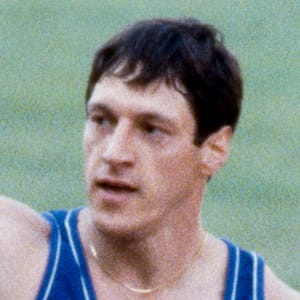Allan WELLS
Biographie
Allan Wells began his athletic career by winning the 1970 Scottish Junior triple jump title and in 1972 he cleared a respectable 7.32 (24-0¼) in the long jump. But after seeing the Jamaican Don Quarrie win both sprints at the 1970 Commonwealth Games in Edinburgh, Wells decided to try the sprints himself, though it was not until 1976 that he first achieved a legal clocking of better than 11.0 for the 100 metres.
Although he won the AAA Indoor 60 metres title in 1977, his outdoor season was relatively undistinguished. The following year, however, saw him establish himself as a world-class sprinter. His powerful physique and springing skills were developed by his coach Wilson Young, a former professional sprinter, although Young was unable to convince Wells of the merit of using starting blocks.
In July 1978, Wells equalled Peter Radford's 20-year-old UK 100 metres record of 10.29 and six days later he brought the record down to 10.15. The following month he showed magnificent form at the Commonwealth Games in Edmonton; in the 200 metres he set a UK record of 20.61 in the heats before running a wind-assisted 20.12 to win the final, while he won a second gold medal in the relay and a silver medal in the 100 metres.
In 1979, Wells twice improved the UK 200 metres record and claimed a major scalp when he defeated the Italian Pietro Mennea at the European Cup final in Turin. Due to an alteration in IAAF rules, Wells we obliged to use starting blocks at the Moscow Olympics but he soon showed that he had adapted to the change by setting a UK record of 10.11 in the heats of the 100 metres. He went on to win a desperately close final – both he and the pre-race favorite, Silvio Leonard of Cuba, were given the same electronic time of 10.25 but it was Wells, at the age of 28, who became the oldest ever winner of the Olympic 100 metres title. He failed by the narrowest of margins to win the 200 metres and his time of 20.21 behind Mennea was a UK record. He claimed a third UK record as a member of the relay team that finished in fourth place. Although Wells had other successes ahead of him, his times in Moscow were to prove the fastest of his career without the benefit of wind assistance.
With wins in the IAAF "golden sprints", the World Cup and the European Cup in 1981, Wells confirmed his position at the top of world sprinting but his early form in 1982 was disappointing. However, in October at the Commonwealth Games in Brisbane he won the 100 metres and shared the 200 metres title with Mike McFarlane.
In 1984, at 32, he made the Olympic team for a second time and although he was eliminated in the semi-finals of the 100 metres, he was a member of the relay team that did well to reach the final. The UK records of Wells, who was married to the international sprinter, Margot Wilkie, remained unbeaten until the emergence of Linford Christie. After retirement he worked as a coach for the British bobsleigh teams and remained involved in athletics through his wife’s Margot Wells School of Speed coaching programme.
Personal Bests: 100 – 10.11 (1980); 200 – 20.21 (1980); LJ – 7.32 (24-0¼) (1972).
À la une
Résultats olympiques
Athlete Olympic Results Content
You may like

